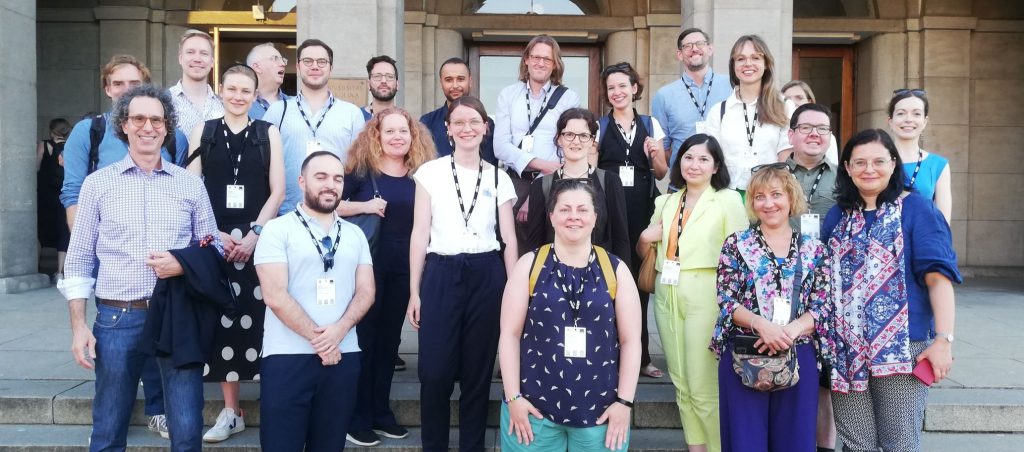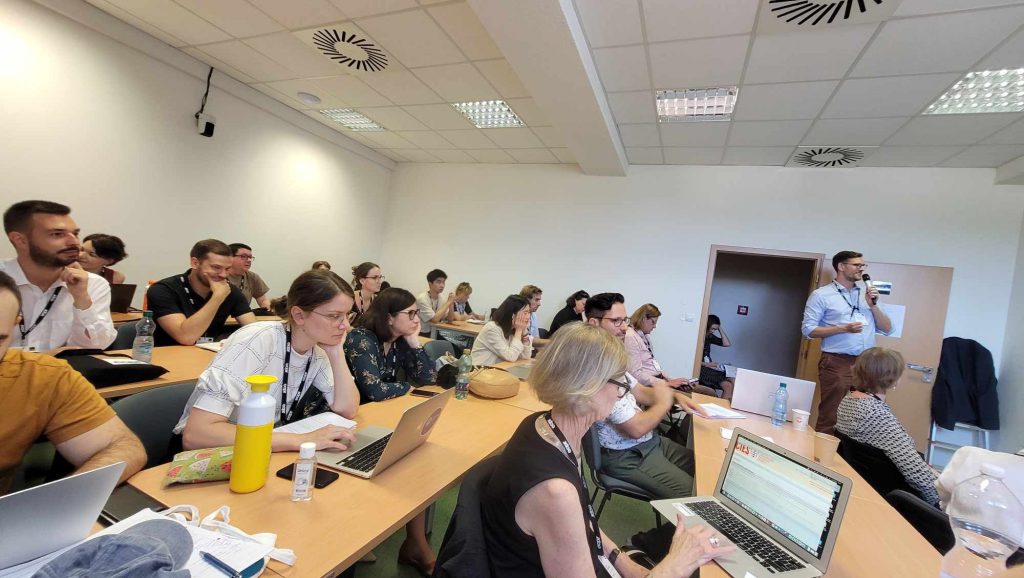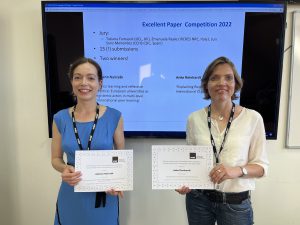
Knowledge Politics and Policies Standing Group in Prague
The 2023 edition of the General Conference of European Consortium for Political Research (ECPR) took place in Prague, 4-8 September. The section of our ECPR Standing Group Knowledge Politics and Policies included nine panels on politics and policy of academic mobility and diplomacy, universities, higher and vocational education, research, and Artificial Intelligence. This year our section on Knowledge Politics and Policies took place for the 12thtime and was probably one of the biggest sections we have had so far. Our panels were so well attended that in some of them the audience had difficulties to find seats, as there was standing room only. This blog post provides insights from rich presentations and discussions in a number of our panels, written by the panel chairs.
Contemporary issues in shaping universities
As an open topic panel, “Contemporary issues in shaping universities” addressed diverse issues from student politics in Sub-Saharan Africa, over the construction of competitive higher education regions in China, to education to work transitions.
Andrea Kronstad Felde drawing on a case study of Makerere’s student union (Uganda), discussed the party influence on student politics and decision-making and how students aimed to reinstate and reinvigorate a representative body for the students. The presentation not only fills a void of decreasing research on student politics during the last decade but adds a much-needed non-Western case study. Adding to the non-Western perspective, Taixing Sheng’spresentation (with Tatiana Fumasoli) discussed the politico-cultural project of the Guangdong-Hong Kong-Macao Greater Bay Area (GBA). Drawing on descriptive analysis, he mapped out the advances and challenges of artificially bringing together three highly diverse regions in China to establish a common competitive higher education area to rival long established global lighthouses such as the San Francisco Bay Area. In comparing the two, he provides valuable insights into utopian engineering of large cohesive economic powerhouse through metrics, cultural integration, and coercive cooperation.
Building on a collaborative chapter with colleagues from the University of Bath, Predrag Lazetic analysed political and media perceptions of students as future workers across Europe and contrasted them with student’s self-perceptions from Eurostudent data. While the public and policy discourse predominantly frames them in human capital terms as rationalist decision-makers and as an economic resource, students distanced themselves from such prescriptions, leaning towards credentialist or oppositional frames of Bildung or vocationalism. Finally, Alexander Mitterle addressed the increasing academization of work through the institutionalization of new degree programs without corresponding roots in the German labour market, namely Public Policy degrees. He shows organizational specificities, strategies and emerging field structures to which public policy schools adhere. Despite a lack of corresponding job positions, students overall find jobs according to their degree specialization and their positions.
Artificial Intelligence: power, politics & policy
Since 2020, a panel on AI politics, policy and power is a regular part of the Knowledge Politics and Policy section. This year’s panel started by launching a newly published special issue on Politics and policy of Artificial Intelligence, edited by Inga Ulnicane and Tero Erkkilä. This special issue, published in Review of Policy Research, includes nine articles on topics such as access to public digital services, construction of food courier profiles, intersectional bias, gender equality, policy paradigms, narratives and sociotechnical imaginaries as well as global standards and rankings. Many of these articles have benefited from the discussions in previous ECPR General Conferences, which also helped to identify five overarching themes for this special issue: social and political co-shaping of AI, the role of ideas, power, continuity and change, and interactions among developments at local, national, regional and global levels.
The talk by Meng-Hsuan Chou was based on her special issue article, co-authored with Catherine Gomes on Politics of on-demand food delivery: Policy design and the power of algorithms. Their contribution contrasts social construction of food courier profiles in Melbourne and Singapore, highlighting the role of policy. The two following talks examined AI governance in the EU. Ville Aula and Tero Erkkilä presented their study on politics of transparency, based on analysis of public consultation on the EU AI Act. Ronit Justo-Hanani draw on her recent article on AI regulation in the EU to discuss political drivers behind it. She also highlighted similarities across governance of various emerging technologies, mentioning her forthcoming book on governing nanotechnology safety. Lively discussions during the panel on issues of regulation, power asymmetries and generative AI underlined the political salience of its topic.
Higher education and research facing unstable circumstances
A starting point for the panel “Higher education and unstable times” was that higher education and research sectors are increasingly facing unstable circumstances. This includes societal, political, technological instability where existing institutional structures and norms may become challenged. With this starting point, the panel examined various aspects concerning the role of higher education during crisis and instability.
In the first of three papers “Resisting Big Science: Why Local Opposition to the Thirty Meter Telescope Sustained Momentum”, Anna-Lena Rueland (University of Leiden), presented an analysis of how Native Hawaiians mobilized a remarkably long-term opposition towards the construction of the Thirty Meter Telescope (TMT) on Mauna Kea, Hawaiʻi Island. In the second paper, “Education reforms in Europe’s knowledge economies: The impact of technological change on higher education”, Doglas Nunes de Sousa (Europa-Universität Flensburg) explored the role of technological change on higher education, in particular exploring the intersection between technological change, higher education policies, and labor market in Ireland and Spain, focusing particularly on the regional level. In the third and final paper of the panel, Mari Elken & Peter Maassen (both University of Oslo) examined policy changes in Europe in the area of internationalization of higher education in the context of current geopolitical and social challenges.
Knowledge policies in a globalized world

Standing room only for the Knowledge policies panel
In the panel “Shaping knowledge policies in a globalized world – Actors, structures, and policymaking dynamics” the different contributions addressed the key question how knowledge policies in today’s globalized higher education world come about. In the first contribution Silje Svartefoss from the University of Oslo analyzed the policy process leading to the creation of two mission-oriented innovation policies in Norway. Focusing on coordination of different actors as a key challenge the presentation highlighted that the two mission-oriented policies encountered different levels of coordination challenges that can partly be traced back to the number and type of actors involved in the process.
The second contribution by Tim Seidenschnur from the University of Kassel and Leonie Buschkamp from the University of Hannover presented a theoretically well-grounded analysis of dynamics of competition in three distinct organizational fields, namely a company, higher education, and the arts. Using extensive empirical material from the three contexts, they manage to trace differences in the way competition materializes which they explain by specificities of the organizational fields under study.
The third contribution by Yiran Zhou from the University of Cambridge presented a detailed analysis of the Chinese Discipline Evaluation in higher education focusing on its specific Chinese characteristics. Her work highlights the fact that the lack of precision in defining what the term “Chinese characteristics” refers to in the context of this evaluation scheme is by no means a flaw of the system but rather a desired imprecision that provides more room to maneuver to the state agency that is in charge of conducting these evaluations. This can be explained as one tool in the toolbox that the Chinese state uses to ensure control over their higher education system.
In the final presentation Jens Jungblut from the University of Oslo presented the main findings of a recently published edited volume. This book presents a comprehensive assessment of the politics of higher education policy in Western Europe, the US and Canada along 5 key aspects of policymaking. Through multiple levels of comparison, the volume also traces differences and similarities across contexts, contributing to the conceptual debate between sociological and historical institutionalism.
European Universities initiative
The panel “European Universities Initiative – taking stock and looking forward” focused on one of the most recent EU flagship projects, which concerns establishing of transnational alliances of universities. Developed rather quickly (in less than a year), it garnered significant EU-level support and funding despite (a) concerning an area in which the EU has only supporting competence and (b) the overall crisis of the European integration project. Five papers were presented, two focusing primarily on EU level developments, while the other three explored the impact of EUI on national and institutional levels.
Paper by Alina Felder and Martina Vukasovic covered the process leading to the launch of the first call of proposals and in particular the role of associations representing interests of higher education institutions. Nadia Manzoni explored the extent to which the European Universities Initiative triggered a new wave of institutional changes in the EU, in particular concerning emerging transnational governance structures.
Antonin Charret’s study put Member States’ positioning towards the EUI front and centre, both in relation to the EU level developments as well as in relation to the participation of their universities in various alliances. In her paper, Marina Cino Pagliarello analysed whether and how transnational alliances developed within the EUI framework act as informal diplomatic actors. Finally, Marco Cavallaro (a paper co-authored with Agata Lambrechts), provided novel evidence concerning the extent to which the goal of relative balance between excellence and inclusiveness within the scheme has been achieved. This varied set of papers, each focusing on a different aspect of the EUI, provided ample material for discussion concerning the novelty of this flagship project, its impact on European, national and institutional levels and theoretical and methodological approaches suitable for studying it.
Standing Group affairs: excellent paper award and membership renewal
As every year, during the conference we held the business meeting of our Standing Group. The highlight of the meeting was the award ceremony for the winners of the latest edition of our excellent paper award for emerging scholars – Dr. Adrienn Nyircsák and Anke Reinhardt. Soon the call will be out for the next round of the excellent paper award – stay tuned.

Excellent Paper Award winners Dr. Adrienn Nyircsák and Anke Reinhardt
At the moment, one of the key items on the Standing Group’s agenda is membership renewal. If you are a member of the Standing Group, please log into your My ECPR profile, go to ‘My Groups’ and renew your membership by 30 September. If you are not a member yet but would like to join our group, you join here, by following ‘Join Standing Group’. We would like to continue and expand our collaboration and see many of you in the 2024 edition of the ECPR General Conference in Dublin next August. We hope to have a bigger room!

